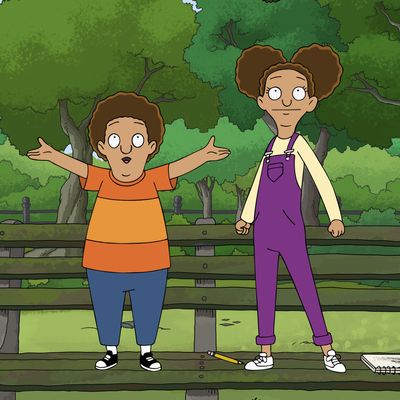
Central Park, a new Apple TV+ animated comedy from Josh Gad and Loren Bouchard, is a delight that’s also sometimes a misfire. Like Bouchard’s beloved animated hit Bob’s Burgers, Central Park is ultimately a fairly simple show about a family of strange, sweet people who are all trying to do their best in the world. But it’s also got a hefty amount of associated premise — probably more premise than is strictly necessary — and at times seems to trip over its own silly, ornate trappings. With some time to work out the kinks, though, it has the potential to become an extremely endearing show.
The series is about a family who actually live in an old mansion inside New York’s Central Park, because the father, Owen (Leslie Odom Jr.), works as a park manager. Owen is essentially an urban park ranger, complete with a naturalist’s love of native plantings and a pair of small tan shorts. His wife Paige (Kathryn Hahn) is a journalist, and their two kids Molly (Kristen Bell) and Cole (Tituss Burgess) are odd in the fun, gloriously awkward ways that kids in Bouchard productions tend to be. The voice acting is uniformly good, even though casting Kristen Bell as a biracial kid is an uncomfortable, unfortunate choice. (There were no actors of color available? The appeal of a Bell-Gad Frozen reunion was more important than avoiding a Diane-in-BoJack whitewashing problem?)
The outlines of those family characters are a little sketchier than they should be, though — the kids are less distinctive, and much of the family feels pulled together from various characteristics in their Bob’s Burgers counterparts. Molly’s boy-obsessed, but she hasn’t attained quite the same unmistakable, sometimes unnerving individuality as Tina. Cole’s sweet and often lives in his own world, and feels very much like a Gene Belcher who’s not quite as loosely unhinged.
These are the kinds of nascent, inchoate qualities that are common and totally excusable in a family comedy. It takes time for characters to attain their full weirdness and distinctiveness. It also takes time for internal family dynamics to feel really lived-in and tested. Paige is built as a flighty, forgetful, passionate but underused journalist, and within the first four episodes provided to critics, Central Park can’t quite decide whether she’s supposed to tilt toward eccentric competence or haphazard mediocrity. Owen is exasperated by her while also being supportive, but their chemistry lacks the sense that there’s an iceberg’s worth of marital love, respect, and frustration lurking under their interactions. It’s a little unfair to the show to keep making Bob’s Burgers comparisons, but I kept looking for that feeling Bob and Linda have, that they’ve actually been married to each other for centuries. The most miraculous family comedies feel like they’ve got years of history under their belts from the moment they begin. Central Park could definitely still get there, but that lived-in feeling isn’t there from the jump.
Instead, much of the energy of the show has been funneled into its many additional layers of storytelling folderol. Note: I love ridiculous folderol in my TV, and generally wish there were lots more of it. But Central Park has a bit too much. First, it’s a musical, which is both a relief and a burden. Its voice cast, which also includes Daveed Diggs and Stanley Tucci, is full of fantastic musical talent. Plus, the songs themselves are fun and punchy and do exactly what they’re supposed to do — shade in additional character development, particularly for characters who didn’t get much of it in the straight dialogue parts of an episode. Molly’s number “Weirdos Make Great Superheroes” is the clearest statement we get about who that character is. But musicals are self-commentary engines. They regularly ask characters to step outside themselves and deliver big internal monologues about their place in the world, or they pause the action so everyone can reflect on major themes of the story so far. Musicals are always operating in a register that’s transparently extra-fictional, where the device of the storytelling is just as visible as the story it’s telling.
What I’m saying is that musicals are already a lot, narratively. On top of that, though, Central Park shoehorns in the additional layer of a narrator character named Birdie, a park troubadour voiced by Josh Gad. Birdie operates both within and outside the story, and my hope is that in later episodes, he’ll feel more like a comfortable, slightly winking side character figure than role he plays at the start, which is like a frantic, overly enthusiastic storyteller already worried that he’s losing control of the narrative. Central Park has plenty going for it already; it doesn’t need a half-Jiminy Cricket, half-Deadpool side character to keep the action together.
That said, I had a great time with the four episodes of Central Park I watched. They’re refreshing and funny, and Stanley Tucci as the evil wealthy park benefactor Bitsy Brandenham is an incalculable treasure. If the show has a chance to relax into itself, and can manage to get out of its own way, it might become a real TV bright spot.


